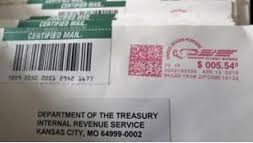Why You Should Not Ignore Mail from the IRS – Although the issuance of an IRS Notice of Deficiency is usually the first step in the collection of an outstanding tax liability, ignoring it can have serious consequences. The Notice of Deficiency is an official communication from the IRS informing a taxpayer that the tax amount due shown on their tax return is less than the amount owed according to the calculations of the IRS. Because the IRS is allowed to collect a tax debt without proof that the debt exists, a taxpayer who receives an IRS Notice of Deficiency must either pay the tax liability shown on the notice or file a petition with the United States Tax Court contesting the tax amount owed. The burden of proof rests with the taxpayer.
A Notice of Deficiency is a formal written communication from the IRS. It is sent by certified or registered mail to a taxpayer’s last address of record for the purpose of announcing a tax deficiency. It must include an explanation of the deficiency together with a statement of the total amount of taxes, interest and penalties that have been assessed. In addition, the Notice of Deficiency informs the receiving taxpayer of their appeal rights with the United States Tax Court and states the cutoff date for filing an appeal. Although a IRS Notice of Deficiency is most often sent when there is a discrepancy between IRS calculations and the tax amount due shown a on a tax return, it can also be sent when no tax return has been filed.
A taxpayer must respond to a Notice of Deficiency within 90 days from the date it was mailed or within 150 days if it was mailed to an address outside of the United States. The taxpayer must either pay the assessed tax liability or to file an appeal with the United States Tax Court. Once the appeal deadline has passed, the appeal process is closed and the IRS has the authority to collect the tax amount owed. At this point, the IRS is likely to issue a Notice of Intent to Levy. The Notice of Intent to Levy allows a response time of 30 days (which is not required if the IRS determines that collection of the tax debt is in jeopardy), after which a taxpayer’s property can be seized to cover their tax debt. A taxpayer’s only option once the 90 day appeal deadline has passed is to pay the tax balance owed and apply for a refund, although even this action may not stop the collection process once it is set in motion!
Because tax law is complex and receiving an official communication from the IRS can be intimidating and sometimes confusing, it may be advisable for a taxpayer to enlist the services if a qualified tax professional before responding to a Notice of Deficiency. A CPA or Enrolled Agent will be able to determine whether the tax amount shown on the Notice of Deficiency is accurate and will be able to communicate effectively with the IRS on the taxpayer’s behalf.
If you have received an IRS Notice of Deficiency, a Notice of Intent to Levy or have been officially warned of an impending tax lien or wage garnishment, we can help you stop the immediate collection activity and work toward resolving your tax debt. Visit www.professionaltaxresolution.com to learn more about full range of tax settlement services. Contact us today at (949) 596-4143 or email us at info@protaxres.com to receive a free, no obligation consultation and get the tax relief you deserve.


